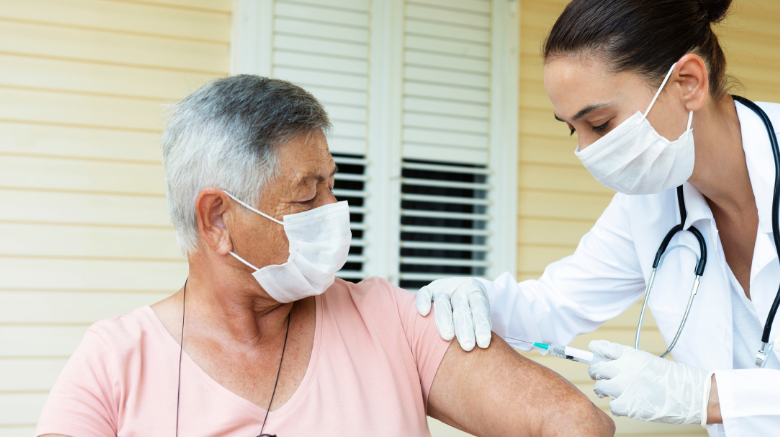Around the world, many governments are excluding forcibly displaced communities from vaccination programs.
Asylum Access Mexico
When Mexico’s National Vaccination Program was established, it did not mention migrants, people seeking asylum, or refugees. Although they weren’t specifically excluded, there was great uncertainty on whether foreigners in general would have access to the vaccine.
Asylum Access quickly took action to make sure all communities would be included. In March, our strategic litigation team filed a lawsuit against the Mexican government for discrimination and limiting the human right to health care. Although the judge did not ultimately rule in our favor, the Health Ministry subsequently changed the National Vaccination Program to specifically include foreigners in Mexico. This was a good example of the power of strategic litigation in the fight for refugees’ access to their human rights, even when we don’t ultimately win the case.
Asylum Access Mexico’s Hospitality Route team also worked on the issue of vaccine access. To prevent vaccine misinformation, the Hospitality Route partnered with the TecSalud Foundation on a Facebook Livestream in which a health professional spoke about the myths surrounding COVID-19 vaccines. The stream reached over 1,000 people on the day of its transmission. From then on, we have continued to share the video on our social media and amongst clients of Hospitality Route, aiming to provide them with accurate information that will help dissipate their fears surrounding the vaccine.
Asylum Access Mexico also developed a program to accompany refugees and people seeking asylum in their vaccine registration and appointments. We continue to promote this program through our social media accounts since the vaccine is now open for everyone 18 years and older.
Asylum Access Thailand
Thailand faced significant difficulty in securing vaccine doses for its population throughout the pandemic and so its vaccination program has only become widely available in the last few months. Right now, the vaccination program is a mixed dose, with the first dose being Sinovac and the second dose being AstraZeneca.
On October 14, 2021, vaccinations were finally made available for certain groups of refugees. This only included people with valid passports and visas (e.g. tourist/migrant worker/student) who were then able to register for the vaccine through the usual Thai government platform. However, there has been hesitancy from refugee communities who can access this route because there is concern about identifying themselves to government officials.
Refugees who do not have a passport, but do fall under the remit of the UN Refugee Agency (UNHCR) are currently being contacted and registered by the UNHCR to receive the vaccines through the Royal Academy Hospital.
Refugees who neither have a passport nor fall under the remit of UNHCR have had the most difficulty accessing the vaccine, and this is the main group that Asylum Access Thailand is supporting.
Asylum Access Thailand is referring some clients to HOST International who is managing a vaccination program for persons in this category in a state neighboring Bangkok. Asylum Access Thailand is also working with CRSP (the Coalition for the Rights of Refugees and Stateless Persons) to negotiate with provincial governments and encourage them to offer vaccination programs to refugee communities. For example, Bangkok’s provincial government has already vaccinated some refugee populations.
Asylum Access Thailand is also sharing credible information about the pandemic, hygiene and safety, and available vaccination programs through their community outreach team and refugee paralegals. We have also published a COVID-19 Handbook for refugee communities in Thailand in 13 languages. Additionally, Asylum Access Thailand is currently undertaking community-based research on the impact of the COVID-19 pandemic on refugee communities in Bangkok — to be published in Spring 2022.
Asylum Access Malaysia
Malaysia has faced fewer issues in securing vaccines. Refugees have been able to register for vaccination through the government platform using several forms of ID since May 2021. Walk-in vaccination clinics are now open and available to anyone, including refugees.
Asylum Access Malaysia continues to share credible information about the pandemic, hygiene and safety, and available vaccination programs through our community outreach team, refugee community advocates, and Telegram channels in six languages. We have also produced videos in English, Arabic, and Farsi about how to register for the vaccination program through the government mobile app. Additionally, we held info and Q&A sessions with Dr. Radzi Hamzah with live interpretation in Burmese and Somali so that refugee communities could ask questions about COVID-19 and the available vaccines to assuage their concerns and tackle misinformation.
Asylum Access evaluates success by assessing our impact on individual refugees and families and works continuously to ensure that refugee rights are represented. As the pandemic continues to create inequities around the globe, Asylum Access is working towards ensuring the safety and accessibility to vaccines and other forms of healthcare for our clients around the world.

